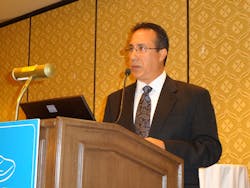California, a bellwether state for the nation when it comes to business regulations, continues to enact stricter rules on the use of chemicals, including some that are used in the automotive aftermarket. Attendees at the Automotive Aftermarket Products Expo (AAPEX) in Las Vegas learned that automotive aftermarket companies have already suffered from existing state regulations and will likely be encountering more restrictive regulations.
Lawyers from the Washington, D.C.-based Arent Fox LLP presented an overview of California’s chemical management rules. Under the state’s Proposition 65 law, which is intended to protect consumers from hazardous chemicals, there are 800 chemicals identified which are believed to be harmful.
Companies using these chemicals are required to have warning labels on them. According to Debra Albin-Riley, one of the Arent Fox lawyers, a company can use a listed chemical if the potential exposure to a person poses no significant risk.
Proposition 65 allows the attorney general or private citizens to sue companies to enforce the law. She said there have already been 2,000 such actions. “Oftentimes, these lawsuits really don’t have merit,” she said. Defendants have 60 days to comply with the law or to respond.
One such chemical is DEHP, which Victor Danhi, another one of the attorneys on the panel, described as a “plasticizer” that is used in 60 percent of all plastic products. Danhi noted that in June of 2013, an oil filter wrench used in auto repair contained DEHP.
This past October, a manufacturer, distributor and retailer received a notification about a steering wheel containing DEHP.
In 2012, a manufacturer and retailer were sued because an auto crimping tool kit allegedly contained DEHP in its vinyl handle.
In such cases, defendants can seek “injunctive relief,” pay a civil penalty which can be as high as $2,500 per day, or agree to a settlement, Danhi said. “Most of these cases result in settlement,” Danhi said.
Danhi said it’s important to address lawsuits as soon as possible.
Defendants have the option of asking the state attorney general to negotiate a settlement. In California, defendants have the option of seeking to join an “opt in” settlement. Defendants can choose to “opt in” to a settlement agreed to by the state attorney general. There is usually a limited time period for opting in.
Maureen Gorsen, another attorney with Arent Fox, offered an update on the California Green Chemistry Initiative, passed in 2008. The law calls on the state department of substance control to determine if products can be made with more sustainable materials. “There is absolutely nothing in this with merit to businesses,” Gorsen said.
Under this law, which became effective in October of 2013, the state will be asking businesses for lists of chemicals used in their products. She noted that manufacturers, importers, assemblers and retailers will all be affected.
Companies using listed chemicals will be asked to identify “potentially viable alternatives.”
Gorsen said rules governing the use of five products will be announced in April of 2014. The state expects to have a list of 2,354 chemicals covered by 2016.
Gorsen said anyone can petition the state to add chemicals to this list. Once a chemical is added to the list, it cannot be delisted for three years.
“The subjectivity in how they list is going to be amazing,” Gorsen said.
Manufacturers of listed chemicals will have 180 days to submit a compliance plan. Once the state receives the plan, they will decide what the regulatory response will be.
Gorsen said the state will have a “web of shame” on its website for companies failing to comply with the law.


